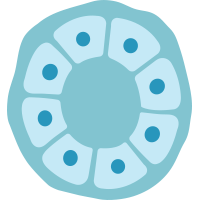
Mammary Cell News
Mammary Cell News is an online resource covering the latest research into breast cancer and mammary cells.
Sympathetic Nerve Signals: Orchestrators of Mammary Development and Stem Cell Vitality
[Journal Of Molecular Cell Biology] Using a mouse mammary gland model, investigators delved into the regulatory role of sympathetic nervous signaling in the context of mammary stem cells and mammary development.
Resf1 Is a Compound G4 Quadruplex-Associated Tumor Suppressor for Triple Negative Breast Cancer
[PLOS Genetics] Researchers identified Resf1 as a novel metastasis susceptibility gene in ER- breast cancer. Reduction of Resf1 resulted in a significant increase in tumor growth, a shortened overall survival time, and increased incidence and number of lung metastases, consistent with patient data.
WDR61 Ablation Triggers R-Loop Accumulation and Suppresses Breast Cancer Progression
[FEBS Journal] Researchers elucidated the role of WDR61 in breast tumor development, and reported that knockdown of WDR61 compromised the proliferation of breast tumor cells with reduced colony-forming capacity.
A Comprehensive Overview of Metaplastic Breast Cancer: Features and Treatments
[Cancer Science] The authors provide a comprehensive review on the clinical features, molecular characteristics, invasion and metastasis patterns, and prognosis of metaplastic breast cancer, as well as recent advancements in treatment strategies.
The DRAP1/DR1 Repressor Complex Increases mTOR Activity to Promote Progression and Confer Everolimus Sensitivity in Triple-Negative Breast Cancer
[Cancer Research] Scientists identified upregulation of the transcriptional corepressor DRAP1 in TNBC, which was closely associated with poor recurrence-free survival in TNBC patients.
Phosphoglycerate Mutase 1 Promotes Breast Cancer Progression through Inducing Immunosuppressive M2 Macrophages
[Cancer Gene Therapy] Scientists reported that phosphoglycerate mutase 1 suppression in breast cancer cells led to a decrease in M2 polarization, migration, and interleukin-10 production of macrophages.
Intensity Therapeutics, Inc. and The Swiss Group for Clinical Cancer Research SAKK Sign a Collaboration Agreement to Conduct a Phase II Randomized, Clinical Trial...
[Intensity Therapeutics, Inc.] Intensity Therapeutics, Inc. announced that the company executed a collaboration agreement with The Swiss Group for Clinical Cancer Research SAKK to conduct a Phase II randomized, controlled trial evaluating clinical and biological effects of intratumoral INT230-6 followed by the standard of care (SOC) immuno/chemotherapy vs. SOC immune/chemotherapy alone in early-stage triple-negative breast cancer in 54 patients in Switzerland.
Continuous TNF-α Exposure in Mammary Epithelial Cells Promotes Cancer Phenotype Acquisition via EGFR/TNFR2 Activation
[Archives Of Pharmacal Research] The authors established MCF-10A cell lines incubated with TNF-α to investigate the effects of continuous TNF-α exposure on the phenotypic change of normal mammary epithelial cells.
miRNA-200c-3p Deficiency Promotes Epithelial-Mesenchymal Transition in Triple-Negative Breast Cancer by Activating CRKL Expression
[Discover Oncology] Researchers found that miRNA-200c-3p was under-expressed and epithelial-mesenchymal transition (EMT)-related genes were up-regulated in TNBC, and miRNA-200c-3p could inhibit cancer cell proliferation, invasion, and the expression of EMT-related genes and proteins in TNBC.
Targeting Resistant Breast Cancer Stem Cells in a Three-Dimensional Culture Model with Oleuropein Encapsulated in Methacrylated Alginate Microparticles
[Daru-Journal Of Pharmaceutical Sciences] Scientists constructed a breast cancer stem cell organoid-like model and evaluate tumorigenicity through targeting the 3D structure with oleuropein.
TMIST Breast Cancer Screening Trial Enrollment Surpasses 100,000
[ECOG-ACRIN Cancer Research Group] The Tomosynthesis Mammographic Imaging Screening Trial (TMIST) has now enrolled more than 100,000 women in the United States and abroad. One of the fastest-growing National Cancer Institute-sponsored trials, TMIST has expanded to 130 participating clinical sites in the US, Argentina, Canada, Peru, Italy, South Korea, and now Thailand.
Targeting EMT Using Low-Dose Teniposide by Downregulating ZEB2-Driven Activation of RNA Polymerase I in Breast Cancer
[Cell Death & Disease] Researchers demonstrated Teniposide as a potent modulator of the epithelial–mesenchymal transition (EMT) program, specifically through an interferon regulatory factor 7 (IRF7)–N-myc and STAT interactor (NMI) mediated response.
For over a decade, Mammary Cell News has been keeping the global scientific and medical communities informed about the latest research, reviews, and news in the field of mammary tissues. Our editors gather publications on the topic of mammary cell differentiation and characterization, as well as the progression and treatment of breast cancer. We also keep scientists up-to-date on the latest policy changes, job postings, and events.

 Cancer Stem Cell News
Cancer Stem Cell News Cell Therapy News
Cell Therapy News Dermal Cell News
Dermal Cell News Endothelial Cell News
Endothelial Cell News ESC & iPSC News
ESC & iPSC News Extracellular Matrix News
Extracellular Matrix News Hematopoiesis News
Hematopoiesis News Hepatic Cell News
Hepatic Cell News Human Immunology News
Human Immunology News Immune Regulation News
Immune Regulation News
 Intestinal Cell News
Intestinal Cell News Mammary Cell News
Mammary Cell News Mesenchymal Cell News
Mesenchymal Cell News Muscle Cell News
Muscle Cell News Neural Cell News
Neural Cell News Organoid News
Organoid News Pancreatic Cell News
Pancreatic Cell News Prostate Cell News
Prostate Cell News Pulmonary Cell News
Pulmonary Cell News
